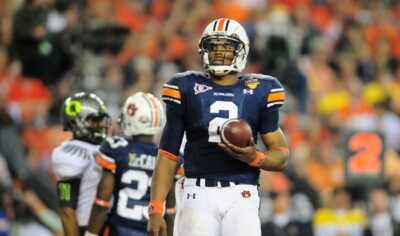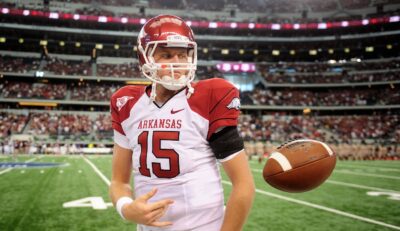
Imagine the reaction if an SEC team was caught cheating like Arizona State allegedly did
Imagine being as bad at cheating as Arizona State was. Allegedly, of course.
That’s not a shot at Arizona State’s No. 52 recruiting class, which only featured 13 signees from the 2021 class (they signed 8 transfers and had limited scholarships available because so many seniors took advantage of the free year of eligibility). To Herm Edwards’ credit, he did sign 4 4-star recruits.
But imagine deciding that you’re not going to follow the extremely cut and dry rule of “no on-campus visits” during the extended dead period because of COVID-19. Then imagine getting busted because someone within the program with intimate knowledge of illegal recruiting visits decided to blow the whistle on everything.
Allegedly, of course.
Imagine if that sort of thing happened in the SEC. You know, the conference that could actually get away with a “conference of champions” association and not get mocked.
I know, I know. The obvious comeback to that is “well, the SEC is better at cheating.” How do we know that’s true? Well, unless I’m forgetting someone, I can’t recall hearing about a completely blatant disregard for recruiting rules put in place because of a pandemic.
Now imagine if an SEC team did just that. Oh, the dots that would be connected.
“See, the South totally doesn’t care about COVID.”
I won’t name names, but you already know who would be first to write that column. And if you don’t, you’re overthinking it.
Would that have been a tough look for the conference? Absolutely, but it would’ve also completely overlooked the fact that the SEC’s push to have a 2020 season was justified. Yes, like everywhere else, SEC teams had outbreaks. There were also individual instances like Dan Mullen’s “pack The Swamp” comment that followed a game in College Station that had the largest 24,709 crowd in the history of college football.
What Arizona State did was far more brazen. The SEC equivalent would’ve been like if Florida indeed packed The Swamp every game after that infamous comment. But that didn’t happen. And regardless of where you stand on COVID, it’s worth mentioning that technically wouldn’t have violated state rules in Florida. It would’ve just been brutal optics.
I mean, Arizona State was so indifferent about cheating that it didn’t even bother to turn its security cameras off. This excerpt from a piece written by Yahoo’s Pete Thamel detailed just how little the rules meant:
Multiple former staffers said that the dozens of recruits who came on campus during the dead period should be easy to track by going through the ASU football building and the surrounding area’s security cameras.
It wasn’t uncommon for Edwards and multiple coaches to host recruits in his office. As the amount of illicit activity rose, tensions simmered in the office. Coaches said that hosting recruits would have been too common to get security officials to agree to shut the cameras off every time a recruit came into the building during a dead period.
So this NCAA investigation should be wrapped up by … the end of this sentence?
One reason it’s perhaps unrealistic to think this could ever happen (or see the light of day) in an SEC program is because of the power dynamic. Edwards, as the Yahoo story outlined, “operates as a mostly hands-off CEO,” and associate head coach Antonio Pierce “has accumulated much of the power in the ASU program thanks to his recruiting reach.” Pierce was allegedly the one who divided the staff and was considered responsible for “in or out” culture that ultimately appeared to come back and bite him.
Call me crazy, but that sounds like a weird way to conduct your recruiting business. That’s not to say all SEC head coaches are 100% locked in to every recruiting visit/inquiry. Still, though. Picture Kirby Smart or Nick Saban being in a hands-off recruiting role. Or I guess because we’re talking about a program that went 11-11 in Pac-12 play under this current coaching staff, I suppose the SEC equivalent to that would be … Mark Stoops?
(For what it’s worth, Stoops is a top-15 coach in America. I’m just saying that’s the comp in terms of how they fared within the conference the past 3-4 seasons.)
There’s no way that Stoops would have that little control over his program. You don’t rise to the ranks of coaching in the SEC — James Franklin is the only SEC coach in the past decade to voluntarily leave the conference for another Power 5 job and it was Vanderbilt to Penn State — and decide that now is the time to operate as “a mostly hands-off CEO.”
Maybe that’s why within the SEC and across the Power 5 ranks, Edwards’ hiring was seen as atypical. Guys who take a decade away from coaching usually aren’t rewarded with a Power 5 head coaching gig, especially when their lone full-time college experience is 3 years of working with San Jose State defensive backs in the ’80s.
The closest the SEC came in recent memory to following that atypical path that was the never-ending message board Grumors of Jon Gruden to Tennessee, which would’ve had a ton of similarities to Edwards. Both were 10 years removed from coaching, both had basically zero meaningful college coaching experience and yet both would’ve been considered a splashy hire because of their NFL pedigrees.
Gruden is considered one of the most hands-on coaches in the sport, but he hated the idea of recruiting. Hence, why he never took the job.
That’s why those types of unconventional hires don’t usually happen. If you’re going to be a Power 5 head coach, you have to be all in as a recruiter.
Don’t mistake what Edwards did (allegedly) as being all in as a recruiter. If he was all in as a recruiter and as a head coach, he would’ve seen the easy way that Pierce’s actions could’ve blown up in his face. And for what? How much of an advantage did he really get by hosting recruits at a time when nobody else could? Again, a class of 13 freshmen and 8 transfers wasn’t even some outlier class for ASU.
That’s been the head-scratching reaction since news of the story first broke on Wednesday. Had it been an SEC program, the outcry would’ve been heard from coast to coast. The lazy generalizations about the SEC would’ve been out in full force. I can picture the tweets now. “COVID: It Just Means Nothing.” Or “The SEC, where cheating just means more during a pandemic.”
Thankfully for the SEC’s sake, it didn’t have one of its teams make baffling decisions to fuel that narrative in the slowest point of the college football calendar. The Pac-12 took that loss. Well, let’s not generalize. Arizona State took that loss and dug itself an unnecessary hole.
Allegedly, of course.
Connor O'Gara is the senior national columnist for Saturday Down South. He's a member of the Football Writers Association of America. After spending his entire life living in B1G country, he moved to the South in 2015.







